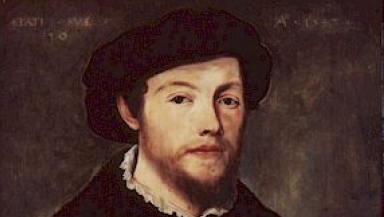
Over a hundred people gathered in St Andrews on Friday to mark the quincentenary of the birth of George Wishart.
Wishart, born in 1513, was a key figure in the Scottish Reformation and mentor of the formidable Reformer John Knox.
Although Knox is more famous, Wishart is gaining increasing recognition among historians as the most powerful preacher in the decade leading up to his trial and execution in 1546.
Wishart was also influential in the English Reformation, preaching in Bristol at the time of Reforming Bishop Hugh Latimer, and was arraigned there for heresy.
He was later exiled on the continent where he came into contact with Henry Bullinger and was profoundly influenced by the first Helvetic Confession of Faith, translating it into English.
Knox described him as " man of such graces as before him were never heard within this Realm, yea, and are rare to be found yet in any man, notwithstanding the great light of God that since his days hath shined unto us".
Wishart was eventually put on trial for heresy at the instigation of Cardinal David Beaton, Archbishop of St Andrews. The 18 charges against him included alleging that every layman was a priest and challenging the concepts of purgatory and prayer to the saints.
He was found guilty and burnt at the stake outside the Archbishop's palace in St Andrews on 1 March 1546. He was 33 years old.
The Quincentennial Conference brought academics and descendants of Wishart to the University of St Andrews to discuss the latest academic research and insights on Wishart.
The academics admitted that a lot of the facts surrounding Wishart's views and theological thoughts were lost, owing to his being a speaker more than a writer, and notably that only second hand accounts remained.
"Sources are piecemeal, contradictory and almost always puzzling," said Professor Martin Dotterweich, of King College in the USA.
Professor Alec Ryrie, of Durham University, said that although many facts were lost, the one fact historians could be sure of was his violent and untimely death.
"Everything about him is under that shadow. We can't help but view his life in the way that we know that it ended," he said.
Prof Ryrie, author of The Origins of the Scottish Reformation, pointed out however that Wishart's reputation suggested a "gentleman" and a "quietly spoken scholar".
"Almost no one has a bad word to say about him," said Prof Ryrie, in contrast to Knox who was the prophet "everyone loves to hate".
Wishart may have been gentle, but the academics present agreed that his preaching was powerful.
Prof Ryrie said his words were full of "radical substance" and made him a "destabilising agent in the middle of a war".
"There is a certain calm and stillness to him but he generated a fierce wind in his wake ... it is understandable Beaton would want to get rid of him," he said.
"It's the destabilising effect of his preaching ministry that makes him a sufficiently dangerous person to put on trial."
Unusually, he was credited with having the gift of prophesy and is recorded foretelling trouble where his message was rejected.
One such occasion was in Dundee where he had delivered a hugely popular series of public lectures on the book of Romans. When the local magistrate forbade him to continue preaching, Wishart announced before the people in the room that "if unexpected trouble comes upon you, remember that this is the cause, and turn to God by repentance, for he is merciful". Four days later, plague broke out in the city and upon hearing the news, Wishart returned to the city to comfort the afflicted and preached once again at the East Port Gate.
Prof Dotterweich elaborated on the account of Emery Tylney, a former pupil of Wishart's, who remembered his teacher giving his clothes to the poor and abstaining from one meal in three, every four days.
Historians could only build an "imperfect portrait" of Wishart, Prof Dotterweich admitted.
"He gets himself in trouble with the things he says, but he is remembered as remarkably kind and charitable to the poor," he said.
Professor Roger Mason, of the University of St Andrews, sought to explore Cardinal Beaton beyond the nemesis role he has traditionally been assigned throughout history.
He suggested somewhat sympathetically that although Wishart was undoubtedly executed because he was regarded as a heretic in Catholic eyes, Beaton was fighting a war with the English and "may have thought [Wishart] was an English traitor".
Professor Jane Dawson, of the University of Edinburgh, assessed the relationship between Wishart and his disciple Knox, pointing to several key areas of influence the latter's views, including his understanding of the battle against the anti-Christ, the role of the prophet as someone sent to admonish and foretell, and the practice of sitting at the Lord's Supper - a major theological dispute at the time.
"Without Wishart, Knox would not have been Knox," said Prof Dawson.
However, given that one of the main descriptions of Wishart comes Knox, Prof Dawson raised the question of how reliable his account was.
"Is Knox modelling Wishart in his own image?" she said.
This question was echoed by Professor Ian Hazlett, of the University of Glasgow, who said one of the challenges for historians was to uncover the real Wishart.
He said: "There is an unnecessary dependence on Knox. Will we ever be able to get behind it?"
The Quincentennial Conference was organised by the Wishart Society in conjunction with the Institute of Scottish Historical Research at the University of St Andrews.













